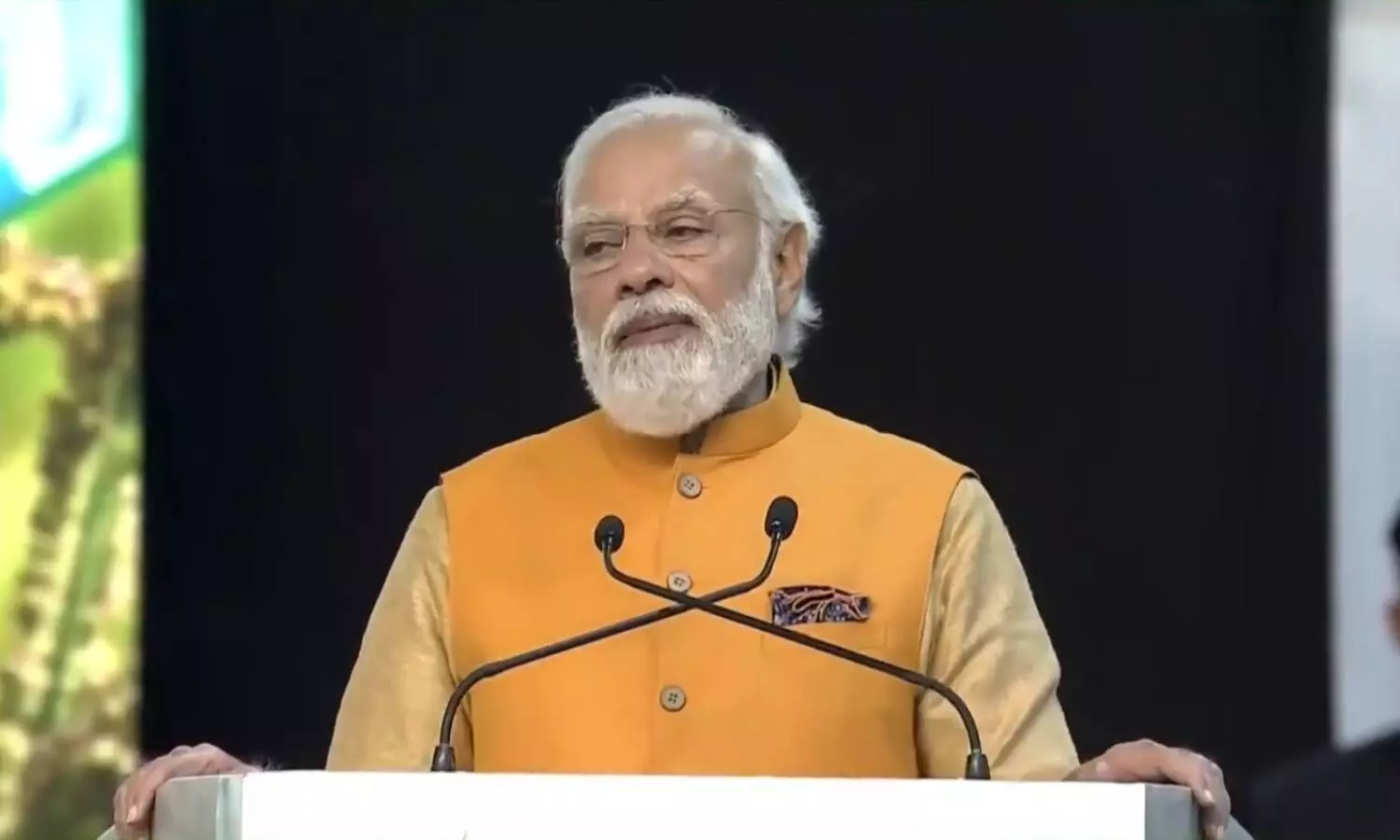'Digital agriculture is India's future': Modi attends ICRISAT's 50th anniversary celebrations
Mr. Modi also unveiled a specially-designed logo of ICRISAT and launched a commemorative stamp issued on the occasion.
By Newsmeter Network
Hyderabad: Prime Minister Narendra Modi visited the International Crops Research Institute for the Semi-Arid Tropics (ICRISAT) campus in Patancheru, Hyderabad, and kickstarted the 50th anniversary celebrations of ICRISAT. The Prime Minister also inaugurated ICRISAT's Climate Change Research Facility on Plant Protection and the Rapid Generation Advancement Facility. These two facilities are dedicated to the smallholder farmers of Asia and sub-Saharan Africa.
Mr. Modi also unveiled a specially-designed logo of ICRISAT and launched a commemorative stamp issued on the occasion. Telangana Governor Tamilisai Soundararajan, Union Ministers Narendra Singh Tomar and G. Kishan Reddy were present on the occasion.
Underlining the importance of the next 25 years for both the country and also for ICRISAT, the Prime Minister stressed the need for new goals. He lauded ICRISAT for its contributions around the world and appreciated its contribution in water and soil management, improvement in crop variety, farm diversity and livestock integration. He also praised its holistic approach in integrating farmers with their markets and promoting pulses and chickpea production in Andhra Pradesh and Telangana. "Your research and technology have helped make agriculture easy and sustainable," Mr. Modi said.
Referring to 15 Agro-Climatic Zones and six seasons of the country, the Prime Minister highlighted the depth of ancient experience of Indian agriculture. He pointed out that India's focus is on the fusion of 'back to basic' and 'march to future' to protect its farmers from climate challenges. "Our focus is on our more than 80% farmers who are small and need us the most," the Prime Minister said.
Technology in farming and food security
He said another dimension of changing India is digital agriculture which he termed India's future and stressed that talented Indian youth can contribute a great deal to this. He listed areas like crop assessment, land records digitization, spraying insecticides and nutrients by drones which are witnessing increased use of technology and Artificial Intelligence. "India's efforts are increasing relentlessly to empower farmers through digital technology," he said.
The Prime Minister emphasized that in the Amrit Kaal, India is focussing on inclusive growth along with higher agriculture growth. Women in agri-sector are being supported through self-help groups. "Agriculture has the potential to take a large chunk of population out of poverty and take them towards a better life. This Amrit Kaal will also provide new means to the farmers of geographically difficult areas," he said.
The Prime Minister said India is working on a dual strategy. On the one hand, a large part of the land is being brought under irrigation through water conservation and connecting of rivers. Water use efficiency through micro-irrigation is being encouraged in areas with limited irrigation, on the other.
He said the National Mission for self-reliance in edible oils indicates India's new approach. The Mission aims to increase palm oil area by six lakh hectares. "This will help Indian farmers at every level and will prove very beneficial for the farmers of Andhra Pradesh and Telangana," Mr. Modi pointed out. He also dwelled on the steps taken to strengthen post-harvest infrastructures like creating a cold chain storage capacity of 35 million tonnes and creation of Rs. 1 lakh crore Agriculture Infrastructure Fund.
India is also focusing on establishing FPOs and agriculture value chain. "We wish to create an alert and potent market force out of small farmers by organizing them into thousands of FPOs," he said.
The Prime Minister said that India's goal is not just increasing food grain production. India has enough surplus food grain to run one of the world's big food security programme. "We are focusing on food security as well as nutrition security. With this vision, we have developed many bio-fortified varieties in the last seven years," said the PM.
Summary of ICRISAT's major achievements over the last 50 years
ICRISAT was set up on 28 March 1972 as part of a global institutional framework to share scientific agricultural breakthroughs and innovations to help overcome poverty, malnutrition, and environmental degradation in the harshest dryland regions of the world.
1. 1972 – ICRISAT was established; ICRISAT being the only International Agricultural Research Center (IARC) with headquarters in India. The Institute collaborates closely with the Indian Council of Agricultural Research (ICAR).
2. 1979 – Gene bank for sorghum, millets, pigeonpea, chickpea and groundnut established; underscores India's growing capacity to deliver robust agri-development outcomes with the Global South.
3. 1980s – The institute sets up offices in Africa as part of its mandate and is firmly positioned as a global agricultural scientific research centre.
4. 1991 – Director-general Leslie D. Swindale is awarded the Padma Bhushan. The same year the world's first pigeonpea hybrid is released by ICRISAT.
5. 1992 – The first Women Farmers' Day is instituted with ICRISAT and ICAR championing women's agricultural empowerment in India.
6. 2007 – ICRISAT's early advocacy for climate-resilient crops and climate awareness delivers the Noble Peace Prize to ICRISAT.
7. 2011 – ICRISAT launches its agribusiness and innovation platform.
8. 2012 – The genome sequence of pigeonpea is published followed by groundnut (2016) and pearl millet (2017); garners international attention.
9. 2017 – ICRISAT's Digital Agriculture programme is operationalized with an i-hub inaugurated. This positions ICRISAT at the forefront of digital agricultural technology, e.g. Meghdoot app a joint initiative of the India Meteorological Department (IMD), the Indian Institute of Tropical Meteorology (IITM), and the Indian Council of Agricultural Research (ICAR).
10. 2019 – ICRISAT wins the National CSR Award India and follows up with another accolade in 2020.
11. 2020 –Two high-oleic acid groundnut varieties developed by ICRISAT and ICAR-DGR are released by Prime Minister Narendra Modi.
12. 2021 –The Tropical Legumes project led by ICRISAT wins the Africa Food Prize.